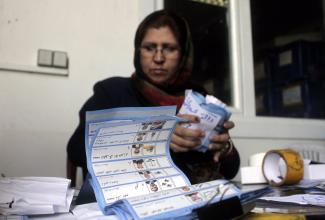News
In brief

The first round
In Afghanistan, voters were called to elect their next president in early April. A run-off election is expected in May. The results of the first round had not been published by the time D+C/E+Z went to press. International observers appreciated that voter turnout was higher than expected and violence remained rather limited. Our picture shows an election assistant counting votes in Kabul. (dem)
Minister Müller invites contributions to Future Charta
Gerd Müller, Germany’s federal minister for economic cooperation and development, initiated a campaign to draft a Future Charta in April. The title of the Charta is "ONE WORLD – our responsibility". The final document will be based on the ideas of German global-development agencies and activists. The ministry has started a debate on relevant issues with civil society, the private sector and academia. Individual citizens are invited to contribute via a website. The ministry plans to finalise the Charta by November. Five topics are at the heart of the debate. They are the environmental, social, economic, socio-political and global dimensions of sustainability. Each topic will be tended to by a host. The hosts are Imme Scholz from the German Development Institute (DIE-GDI), Renate Bähr from DSW (Stiftung Weltbevölkerung – the Foundation for the World Population), Joachim von Braun from the University of Bonn,
Michael Windfuhr from the German Institute for Human Rights and Marianne Beisheim from SWP, Germany’s foreign-policy think tank. Apart from Beisheim, all hosts have contributed to D+C/E+Z in the past. Müller wants the Future Charta to rest on a broad popular base, with citizens assuming responsibility. "We must design globalisation in ways that serve humanity," he said, launching the campaign in April. In his eyes, markets need regulations, and political power must always be limited. On top of that, he wants the sustainability principle to guide all action. The Future Charta is intended to help the ministry prepare for the year 2015 with its important international agenda, including the definition of new multilateral development goals and a global agreement on mitigating climate change. Germany will play a relevant role, not least as president of the G8. (emv)
Link:
http://zukunftscharta.de/ (Only in German)
Staff members of Médecins sans Frontières killed
The humanitarian agency Médecins sans Franontièrs (MSF – Doctors without Borders) announced its withdrawal from Bouguila, a town in the northern Central African Republic (CAR), in late April. The reason was that armed robbers killed 16 persons in the hospital the international non-governmental organisation was running in the town. Three of its staff members were among the dead. Stefano Argenzanio, the head of MSF in the CAR, stated that the agency was checking whether operations in other parts of the strife-torn country were still feasible: "While we remain committed to providing humanitarian assistance to the community, we also have to take into account the safety of our staff." (dem)
ADB evaluation team bemoans inequality
According to the multilateral Asian Development Bank (ADB) economic growth must lead to poverty reduction. All too often, however, results are found to be disappointing. A recent evaluation report states that want and need have indeed declined in many Asian countries. Nonetheless, inequality is said to have grown, and some 1.6 billion people in the region must still make do with a daily purchasing power of less than two dollars.
In the eyes of the ADB, three "pillars" contribute to inclusiveness:
- high sustainable growth to create and expand economic opportunities,
- broader access to these opportunities to ensure that members of society can benefit and
- safety nets to prevent extreme deprivation.
The evaluation team points out that almost 60 % of ADB financing serves the first pillar, while only 30 % contributes to expanding opportunities and
a mere 10 % to improving safety nets. Its report suggests that the Bank’s focus on infrastructure programmes "may have led to a larger than warranted ADB concentration on operations aimed mainly at sustained growth without paying sufficient attention to inclusiveness".
The evaluators want the ADB to pay more attention to what target groups benefit from its programmes. They also insist that the Bank needs to pay attention to inequality in this context and design measures accordingly. Moreover, they argue that action must be coordinated closely with the respective national governemt and other development partners. (dem)
Link:
http://www.adb.org/documents/adbs-support-inclusive-growth







